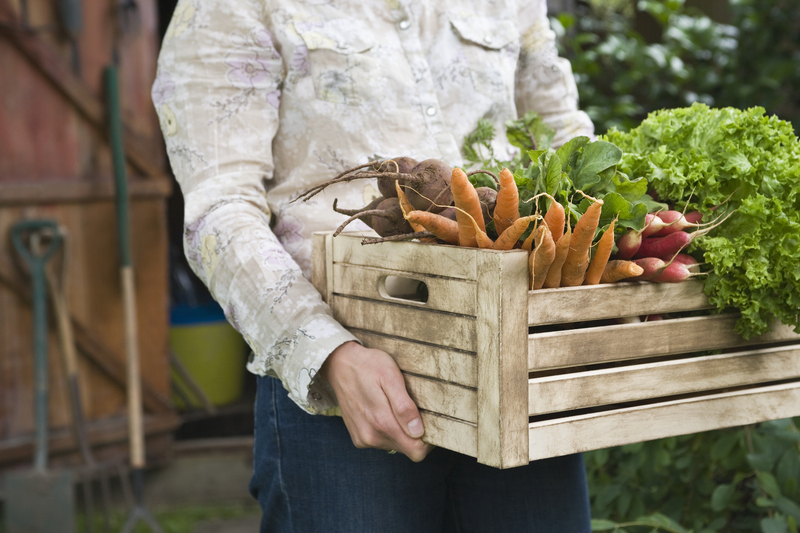Turning Waste into Vital Soil for Tomorrow
Posted on 29/08/2025
Turning Waste into Vital Soil for Tomorrow: Embracing Sustainable Soil Solutions
The quest for sustainable agriculture and environmental preservation has never been more critical than it is today. As populations swell and natural resources dwindle, turning waste into vital soil for tomorrow becomes not just an option but a necessity. Harnessing organic waste--from food scraps to yard trimmings--as a resource rather than a liability is reshaping how we think about soil health, waste management, and our planet's future.

Understanding the Importance of Soil: The Foundation of Life
Soil is far more than just dirt; it is a living, breathing ecosystem essential to all terrestrial life. Healthy soil supports plant growth, cycles nutrients, stores carbon, and acts as a filter for water. Degraded or infertile soil threatens biodiversity, food security, and even human health. That is why regenerating soil by transforming waste into potent, nutrient-rich earth is an idea gaining traction globally.
- Soil supports 95% of all food production
- It stores more carbon than all the plants and the atmosphere combined
- Healthy soil filters and regulates water movement, curbing floods and droughts
The Current Waste Crisis: An Environmental Emergency
Modern society generates staggering amounts of waste. According to the World Bank, the world produces over 2 billion tonnes of municipal solid waste annually--with at least 33% of it not managed in an environmentally safe manner. A large portion of this waste is organic matter--food waste, leaves, agricultural residues, and yard clippings--that ends up in landfills where it decomposes anaerobically, releasing greenhouse gases like methane.
- Organic waste in landfills is a leading source of methane
- Landlocked nutrients in waste could revitalize depleted soils
- Waste collection and disposal account for significant municipal costs
Turning Organic Waste into Rich, Living Soil: The Science
Composting--the process that turns organic waste into vital soil for tomorrow--is a natural recycling system that mimics the forest floor. When executed properly, composting not only reduces the amount of waste sent to landfills, but also generates a rich soil amendment teeming with beneficial microorganisms, nutrients, and organic matter.
The Composting Process: How Waste Becomes Soil
The composting process involves breaking down organic matter in the presence of oxygen (aerobic conditions). Microorganisms such as bacteria, fungi, and actinomycetes decompose the waste, transforming it into humus--a stable, dark, crumbly substance that is essential for fertile soil. The process also destroys pathogens and weed seeds, making the finished compost safe and productive.
- Step 1: Gathering organic waste: food scraps, coffee grounds, grass clippings, leaves
- Step 2: Creating the optimal carbon to nitrogen ratio (ideally 30:1)
- Step 3: Ensuring adequate moisture--comparable to a wrung-out sponge
- Step 4: Regularly aerating the pile to maintain oxygen flow
- Step 5: Monitoring temperature and decomposition for several months
*Composted organic waste is often referred to as "black gold" in the gardening and farming communities, reflecting its immense value for soil health.*
Benefits of Converting Waste into Vital Soil
- Reduces landfill usage and greenhouse gas emissions
- Improves soil structure and water retention
- Increases biodiversity and soil fertility
- Supports sustainable urban agriculture and gardening
- Sequesters carbon, combating climate change
Incorporating composted waste into agricultural systems delivers a double win: lowering the world's waste burden while restoring soil for future generations.
Innovative Strategies for Scaling Up Waste-to-Soil Initiatives
The push for turning waste into vital soil extends well beyond backyard composting bins. Cities, industries, and governments around the world are deploying creative methods to scale up the transformation of bio-waste into productive soil improvements.
Community Composting Programs
Many municipalities have introduced curbside organic waste collection or communal composting drop-off centers, making it easy for households to participate. *Schools, universities, and community gardens are also deeply involved, often serving as educational hubs on the circular economy of waste.*
- Reduces transportation and landfill costs
- Yields finished compost for local parks, gardens, and urban farms
- Builds community awareness and engagement
Industrial-Scale Composting & Bio-Conversion Technologies
Beyond basic aerobic composting, advanced technologies such as anaerobic digestion, vermicomposting, and biochar production are being deployed to handle large quantities of organic waste. These methods not only generate soil amendments, but in some cases, also produce biogas for energy and liquid fertilizers.
- Commercial composting facilities can process thousands of tons annually
- Biogas created from digestion can power homes or businesses
- Biochar locks carbon in soil for centuries, further aiding climate goals
Zero-Waste Cities: The Urban Soil Revolution
Some progressive cities have declared zero-waste goals, aiming to divert nearly all organic and recyclable waste from landfills. These initiatives often integrate urban agriculture, using compost from city-generated waste to feed rooftop gardens, schoolyards, and public spaces--establishing a virtuous cycle where yesterday's leftovers nurture tomorrow's food.
- San Francisco has achieved over 80% waste diversion since mandating composting
- Seoul, South Korea uses smart technology to collect and compost all residential food waste
- Stockholm produces biogas from municipal organic waste to fuel public transport
Barriers and Challenges in the Waste-to-Soil Movement
Despite vast potential, turning waste into soil for the future faces notable challenges. Public awareness, infrastructure investment, contamination of compost streams, and existing regulatory frameworks must all evolve to make wide-scale adoption a reality.
Contamination and Quality Control
Non-organic materials--plastics, metals, synthetic chemicals--often find their way into compost piles, especially in mixed waste streams. This contamination can compromise the safety and utility of the finished soil product. Strict education, sorting, and enforcement are essential for quality compost.
Economic Viability
- Adequate funding and incentives are required for facilities and logistics
- Market development for compost and soil products can be slow
- Processing technology must be suitable for differing waste compositions
*Public policy, private sector innovation, and consumer demand must align to unlock the full value of waste-to-soil conversion systems.*
Changing Mindsets & Behaviors
A major hurdle is shifting society's "take-make-waste" mentality to a circular economy approach. Public outreach, school programs, and visible success stories can accelerate acceptance and participation in waste-to-soil programs.
Emerging Innovations: The Future of Soil Regeneration
As research accelerates and environmental urgency intensifies, innovative approaches to turning waste into essential soil are emerging. Technologies like microbial inoculants, AI-driven sorting systems, and decentralized composting robots are redefining what's possible.
Biological Solutions: Harnessing Nature's Engineers
- Worms, fungi, and specialized bacteria can rapidly decompose waste and enhance soil health
- Mycoremediation uses fungi to break down contaminants, restoring safe, fertile land
Food Waste Upcycling
Some companies are transforming food waste into high-protein animal feed or soil amendments using black soldier fly larvae or fermentation. These new waste uses reduce landfill demand while producing valuable inputs for agriculture.
Tech-Powered Circularity
- Sensor networks monitor compost conditions for optimal outcomes
- AI and robotics streamline sorting, collection, and contamination removal
- Blockchain technology enables tracking and certification of "regenerative soil" products
The Role of Individuals in Cultivating Soil from Waste
While large-scale solutions are crucial, everyone can contribute to turning waste into vital soil for tomorrow. Here's how ordinary households can make an extraordinary impact:
- Start a backyard compost bin or vermicompost system (using worms)
- Participate in local food scrap drop-off or municipal green bin programs
- Educate family and friends about the benefits of composting
- Advocate for community composting and zero-waste policies
- Use finished compost to enrich gardens, lawns, and even potted plants
1. Composting at Home: It's easier than you might think. A simple compost pile needs brown material (leaves, straw), green material (food scraps), water, and occasional turning for aeration. Within a few months, kitchen and yard waste are turned into rich, dark compost.
2. Supporting Local Initiatives: Volunteering at a community garden or compost center not only reduces waste but also fosters neighborhood connection and green spaces.

Global Impact: Why Turning Waste into Soil is Essential for Our Future
The transformation of organic waste into living soil is not a mere environmental trend--it is a critical pillar of global sustainability. By changing how we view and manage our waste, we can:
- Revitalize exhausted agricultural land
- Mitigate climate change by sequestering carbon
- Boost food security through improved soil fertility
- Reduce pollution and landfill reliance
- Enhance community resilience and health
In regions where soil degradation threatens livelihoods, innovations in composting and waste management provide hope for restoring landscapes, supporting local food systems, and protecting biodiversity. In cities beset by waste overflows, community composting revives green spaces and connects citizens to the cycle of renewal upon which all life depends.
Conclusion: Cultivating Hope--Transforming Waste into Soil for Generations to Come
Every banana peel, leaf pile, and coffee ground represents an opportunity--a seed for tomorrow's harvest, a gesture toward a regenerative planet. As we more deeply recognize the interconnectedness between waste, soil, and the future of humanity, turning waste into vital soil emerges as both a responsibility and an opportunity for all.
Whether you are a city planner, a farmer, a teacher, or a homeowner, your choices matter. By embracing soil regeneration through waste transformation, you help build a world where the waste of today nourishes the hope, abundance, and vitality of tomorrow.
Let us commit to turning waste into vital soil for a sustainable tomorrow--healing our land, feeding our people, and replenishing the natural cycles on which all life depends.
Latest Posts
Bringing Back the Bloom in Your Garden
Herb Garden Bliss: From Seed to Plate
Winter Gardening: Protecting Your Plants with Style

